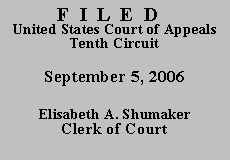

| MAXINE R. ROSE, | No. 05-6245
(D.C. No. CIV-05-308-F) |
Rose challenges her state court convictions for Arson in the First Degree and Endangerment to Human Life by Commission of Arson in the First Degree. Her petition was filed on March 18, 2005, and is therefore governed by the Antiterrorism and Effective Death Penalty Act ("AEDPA"), Pub. L. No. 104-132, 110 Stat. 1214. AEDPA requires persons seeking a writ of habeas corpus who are in custody pursuant to a state court conviction to file their petitions within one year of the date on which direct review of the conviction concluded. 28 U.S.C.
§ 2244(d)(1)(A). The Oklahoma Court of Criminal Appeals ("OCCA") affirmed Rose's convictions on March 25, 2003. Her convictions became final for purposes of AEDPA on June 25, 2003, when the ninety-day period during which Rose could have sought certiorari from the United States Supreme Court had passed. See Locke v. Saffle, 237 F.3d 1269, 1273 (10th Cir. 2001). Rose did not file her federal habeas petition until March 18, 2005. Taking into consideration the tolling period during which she sought collateral post-conviction relief in state court, the district court rightly found that Rose filed her petition three weeks after the one-year limitations period had expired.(2)
We have held that AEDPA's limitations period "may be subject to equitable tolling" if the petitioner is actually innocent. Gibson v. Klinger, 232 F.3d 799, 808 (10th Cir. 2000); Miller v. Marr, 141 F.3d 976, 978 (10th Cir. 1998). This limited exception to the procedural default doctrine was developed to prevent "fundamental miscarriage[s] of justice." Schlup v. Delo, 513 U.S. 298, 324 (1995); see also Sellers v. Ward, 135 F.3d 1333, 1338 (10th Cir. 1998). In order to claim actual innocence a petitioner must present new, reliable evidence that was not presented at trial. Such evidence typically consists of "exculpatory scientific evidence, trustworthy eyewitness accounts, or critical physical evidence." Schlup, 513 U.S. at 324. Once such evidence has been presented, petitioner must further show that in light of the new evidence, "no reasonable juror would have found the defendant guilty." Id. at 329.
The one new piece of evidence Rose presents is the affidavit of Tera Potts, an employee of the Cleveland County Sheriff's Office.(3) Potts attests that she overheard Rose's ex-husband tell another prisoner that he had committed the crime for which Rose was convicted and had framed Rose deliberately. This evidence does not have the indicia of reliability sufficient to make out a claim of actual innocence. At most, the evidence impeaches the credibility of some of the prosecution's witnesses. It does not fall into one of the categories of evidence, enumerated by the Supreme Court in Schlup, that conclusively demonstrates a petitioner's innocence. See id. at 324. Because the requirements for meeting the actual innocence exception have not been met, we affirm the district court's finding that Rose's habeas petition is time-barred and is not subject to equitable tolling.
We granted a COA to Rose on a second issue, her claim of ineffective assistance of counsel. Determining Rose's petition time-barred, however, we do not address that claim. See Robinson v. Golder, 443 F.3d 718, 719 n.1 (10th Cir. 2006) (citing Slack v. McDaniel, 529 U.S. 473, 485 (2000) (holding that where dismissal due to procedural bar is correct, consideration of merits is unnecessary)).
The judgment of the district court is AFFIRMED.
ENTERED FOR THE COURT
Carlos F. Lucero
Circuit Judge
*.The case is unanimously ordered submitted without oral argument pursuant to Fed. R. App. P. 34(a)(2) and 10th Cir. R. 34.1(G). This order and judgment is not binding precedent, except under the doctrines of law of the case, res judicata, and collateral estoppel. The court generally disfavors the citation of orders and judgments; nevertheless, an order and judgment may be cited under the terms and conditions of 10th Cir. R. 36.3.
1. Rose raises a third issue in her appeal of the district court's denial of her petition, on which we did not grant a COA. Rose argues that she should be granted equitable tolling because forces beyond her control made it impossible for her to gather the evidence needed to file the petition within the one-year limitations period. Specifically, Rose argues that she diligently attempted to secure an affidavit from Tera Potts, but was frustrated in doing so by Potts's efforts to make herself scarce. This court has held that this type of delay does not meet the requirement of "extraordinary circumstances" necessary to excuse the failure to timely file. See Marsh v. Soares, 223 F.3d 1217, 1220 (10th Cir. 2000). Accordingly, we deny Rose's request for a COA on this issue and affirm the district court's ruling.
2. Rose has not presented copies of the relevant state trial, appellate, or post-conviction records, foreclosing our independent determination of the appropriate tolling period for her collateral state court appeal. Rose does not, however, contest the district court's finding that her petition was filed after the limitations period had passed.
3. Two additional affidavits included with Rose's petition cannot be considered new evidence for purposes of this appeal. Although one of the affidavits post-dates Rose's direct appeal of her conviction to the OCCA, the substance of the evidence in both affidavits was considered by the OCCA when Rose raised the issue of ineffective assistance of counsel on direct appeal.